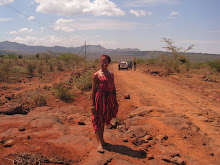On Wednesday, August 14, 2013 it was
a rainy day in Nairobi. The streets were flooded and Thika Road Highway looked
like the residents would need life jackets. I walked hurriedly in the rain as
my shoes sloshed along and the bottoms of my slacks became wet from the
puddles.
I had been invited to attend the
launch of Kenrazy’s new single, Vitambi. I hoped that this
wasn’t just another music album that would hit the shelves and then disappear
into the noise of the thousands of songs that come and go. My steps quickened
as a boom of thunder shattered the sky. Kinrazy’s new single marked the reunion of a
relationship between Grandpa Records, the largest music label in East Africa
and Kinrazy himself.
When I arrived at the venue the air
was full of expectancy as journalists, photographers, dancers and fans filled
the location. DNA was the MC for the evening and after making a formal
introduction he introduced the artist of the hour to describe his music journey
and music style. Kinrazy spoke of the versatility of his music, his pride in
his country and the need for Kenyan artists to be original in their sound.
At a time when many Kenyan artists
find comfort in copying popular culture from the West, it was a breath of fresh
air to hear Kenrazy calling for artists to incorporate their own ethnic backrounds
into their music style. I wish Kenrazy well as he makes a comeback to the music scene
and hope that he will lead the way for other artists in uniqueness and
versatility.
What do you think of Vitambi? Watch the video here and share your views in the comment section below.

